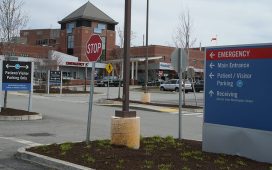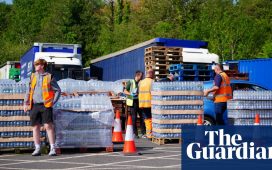BROCKTON — Brockton and the surrounding areas have received a record amount of rainfall this year. In September alone, Brockton received 6.96 inches of rain — almost three inches more than the 20-year average, according to the National Oceanic and Atmospheric Administration’s Online Weather Data (NOWData).
According to that same data, Brockton has had a significantly drier October, with a total of .06 inches over the span of two days at the beginning of the month.
However, the Farmer’s Almanac is predicting a continued pattern of intense precipitation into the winter months.
“Folks living along the I-95 corridor from Washington to Boston, who saw a lack of wintry precipitation last winter, should experience quite the opposite, with lots of rain/sleet and snowstorms to contend with,” the Almanac wrote in its 2024 extended weather forecast.
Due to the historically wet year, and with the possibility of continued precipitation, many residents may be wondering if the city of Brockton has the infrastructure to prevent the kind of catastrophic flash flooding that was seen in New York and New Jersey at the end of September.
Here’s everything you need to know about flooding in Brockton, including where the flood zones are, what the city’s warnings and advisories mean and how much rain the city would need in order to flood.
Why do floods occur?
When rivers, lakes and soil cannot hold and absorb excessive rain or snow melt, flooding can occur. Flooding can also occur when levees, dams or pipes break — like when earlier this year, a 20-foot section of earthen dam gave out in East Bridgewater, flooding 10 to 12 properties along Robbins Pond.
More: ‘Fighting a losing battle’: East Bridgewater dam breaches, flooding homes and yards
Am I living in a flood zone?
According to the Massachusetts Environmental Public Health Tracking’s Flood Zone Mapping Tool, Brockton residents living near Salisbury Brook up through Thirty Acre Pond, Lower Porter Pond, Upper Porter Pond, Waldo Lake and Brockton Reservoir are all within a 100-year flood zone. Homes along French Brook, Edson Brook and Salisbury Plain River going into East Bridgewater, as well as homes along Trout Brook, Carey Brook and Beaver Brook are also included.
To check if your house is in a Massachusetts Emergency Management Agency (MEMA) designated flood zone, use the Flood Zone Mapping Tool and search with your specific address.
What exactly is a 100-year flood zone?
The Environmental Protection Agency (EPA) uses different measurements, including the 100-year flood zone, to describe the risk of flooding in a certain area. A 100-year flood zone means there’s a one percent chance of a flood occurring each year.
While that statistic doesn’t seem significant enough to worry about, the Massachusetts Department of Public Health’s Climate Hazard Assessment Profile clarifies that it means there’s a one in four percent chance of a flood occurring during a 30-year mortgage period.
Quite a few areas are designated 100-year flood zones in and around the Brockton area, and the city has taken steps to minimize the impact of impending floods.
What projects has the city done to minimize impacts of flooding?
Howard Newton, the superintendent of engineers for the City of Brockton, has been working on various flooding prevention projects for 35 years.
“We’ve been working from south to north, with a focus on Salisbury Plain River and Salisbury Brook, which is the center water way going through the center of the city. We’ve been replacing bridges, opening up structures, removing utilities that were suspended beneath these bridges which snag debrief and impede the flow,” he said.
Why should I care if I’m in a flood zone?
According to the Massachusetts Emergency Management Agency, flooding is the most common hazard in Massachusetts and most drownings occur during flash floods.
However, according to Stephan Hooke, director of Brockton Emergency Management Agency (BEMA), in the nine years he’s worked at BEMA, he can’t recall anyone dying from flooding.
“We have had situations where people drive through flooded areas and have to get rescued by the fire department,” he said.
According to the National Weather Service (NWS), there hasn’t been a flash-flood-related death in Massachusetts since at least 2010.
According to the Centers for Disease Control and Prevention (CDC), more than half of all flood-related drownings occur when a vehicle is driven into hazardous flood water. It takes just 12 inches of rushing water to carry away cars and 2 feet for SUVs and trucks.
What’s the difference between a flood watch, flash flood watch, flood warning, and a flash flood warning?
According to the National Weather Service, a flood is an overflow of water onto normally dry land, usually caused by rainfall, storm surges, debris jams in waterways, or breaks in levees, dams or pipes. A flash flood occurs over a short period of time, usually less than six hours after the precipitating event.
According to the Massachusetts Emergency Management Agency, flood and flash flood watches mean these events are possible, but not guaranteed. When these watches go into effect, MEMA recommends paying attention to emergency alerts and changing weather conditions, tying down or bringing in outdoor objects that could be swept away and elevating items stores in basements.
Flood and flash flood warnings mean these events are actively occurring or about to occur. MEMA recommends seeking higher ground immediately.
How much rain will cause Brockton to flood?
“It’s not so much the amount of rain we get but the amount of time we get it in,” Hooke said.
More: The 8th rainiest 24 hours on record: How much rain did the Brockton area get on Monday?
“Typically, if we get three inches of rain in a short amount of time, maybe six hours or so, we’ll get some flooding,” he said.
What areas in Brockton will flood first?
According to Hooke, areas near Ames Street, Howard Street, Belmont Avenue, K-Mart Plaza and Westgate Mall have historically been an issue in terms of flooding.
“But a lot of that has been resolved through hazard mitigation funding over the years,” Hooke said. “Now, the flooding we get is from clogged storm drains.”
Enterprise staff writer Amelia Stern can be reached by email at astern@enterprisenews.com.











